7 Best Asynchronous Video Interview Platforms
Recruitment has entered an era where artificial intelligence (AI) isn’t just a support function, it’s the driving force behind hiring efficiency, precision, and scalability. From parsing resumes to talent evaluation at scale, AI is now present at the core of talent acquisition systems.
We’ve put together the 6 best video interview platforms leading the hiring transformation in 2026.

Best video interviewing software in 2026:
- Jobma
- Hirevue
- Willo
- Spark Hire
- MyInterview
- Hirevire
- PMaps
Top Video Interviewing Platforms
We’ve compiled a list of top video interviewing platforms, based on their technology stack, AI capabilities, data security, user experience, and integration readiness.
1. Jobma
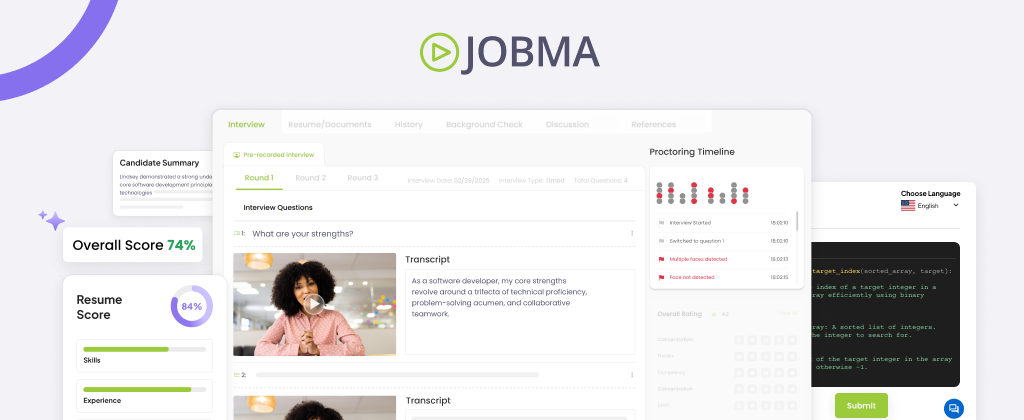
Jobma is an asynchronous video interview platform trusted worldwide. It’s used by organizations across industries like Healthcare, Education, IT, Staffing, and others. The platform supports asynchronous, live, and AI-assisted interviews while offering deep intelligence tools, powerful analytics, and ready-to-use system infrastructure.
Jobma provides a comprehensive video interviewing ecosystem. It’s globally accessible and offers AI-driven assessments and enterprise-grade security. For fast-paced hiring teams, it helps save time, reduce unconscious bias, and maintain consistent candidate evaluations.
Key Features
- Multiple Interview Formats: Jobma supports every format in one unified interface. Whether you’re conducting one-way video interviews or AI-driven interview sessions, Jobma has it all. It allows teams the flexibility to mix two-way and one-way hiring strategies based on the role type and strategy.
- Interview Kit Library: Jobma includes a comprehensive library of customizable interview kits. These are ready-to-use templates with pre-defined questions and evaluation criteria. You can customize these kits by skills, job role, or department, ensuring consistency in assessments across hiring teams and business locations.
- Seamless Integrations: Jobma offers integrations with leading Applicant Tracking Systems (ATS) like:
- Greenhouse
- Workday
- BambooHR
- iCIMS
So, you can send, receive, and review interviews directly within your existing ATS, without having to switch between platforms.
- Talent Intelligence: Jobma’s advanced AI assesses candidate responses to highlight confidence, communication style, and role-alignment. The system generates in-depth summaries that are backed by data. This helps you identify top performers faster.
- Global Multilingual Support: Jobma offers support for all major languages and works well across devices.
These capabilities are especially useful for multinational organizations operating across diverse applicant pools. For candidates, it ensures a hassle-free experience no matter where they’re located.
- Enterprise-Grade Compliance: Regularly certified under SOC 2 Type II and ISO/IEC 27001, Jobma is designed for deep data protection. It also adheres to GDPR and CCPA regulations, provides controlled access rights, and encrypts all video and user data. These capabilities make it one of the most compliance-ready platforms in the industry.
- Ethical AI Framework: Jobma’s AI is built on the principles of transparency, accountability, and fairness to support, not replace, human judgment. You can define score metrics, view detailed summaries, and refer to automated transcripts to understand how the system assesses candidates.
Additional features like structured interviews, standardized scoring criteria, and data-driven evaluation help reduce subjectivity.
Pros
- Jobma delivers a comprehensive video interview suite by combining one-way video interviews, live interviews, and AI interviews in one integrated platform.
- It maintains strong data privacy with enterprise-grade security, end-to-end encryption, and compliance with global regulations.
- The platform scales easily with flexible, cost-effective pricing that includes all features in a single subscription.
- Jobma offers a superior candidate experience with its mobile-friendly interface and apps.
- Built-in analytics help teams track completion rates, timelines, and evaluator performance for more efficient hiring decisions.
- Its deep customization options, including branded interfaces, tailored question flows, and email and text templates, help reinforce the employer brand.
Cons
- Jobma’s feature-rich platform may require a learning curve for first-time users.
- New teams might need onboarding to learn how to navigate the platform, though the training resources could help ease the transition.
2. HireVue

HireVue is a pioneer in the video interviewing industry. It’s known for its AI-powered analytics and long industry experience. The platform combines asynchronous and live interviews with gamified assessments to evaluate candidates’ skills, personality, and cognitive ability.
Key Features
- Cognitive Assessments: HireVue includes gamified behavioral and aptitude tests that measure problem-solving, learning agility, and personality attributes. These assessments are designed to supplement video responses and provide a more holistic view of candidate potential.
- ATS Integrations: HireVue integrates with leading ATSs like Workday, SAP SuccessFactors, and Oracle HCM to keep the candidate data centralized.
- Comprehensive Reports: Dynamic dashboards display key hiring metrics such as completion rates, time-to-hire, and candidate performance scores. Recruiters can filter and analyze this data to identify bottlenecks, improve evaluation criteria, and optimize hiring workflows.
- AI-Driven Video Analytics: HireVue’s proprietary AI evaluates candidate responses by analyzing speech patterns, tone, and micro-expressions. It helps identify job-relevant traits, offering evidence-based recommendations.
- Candidate Scheduling Automation: Built-in scheduling tools automate interview invitations and notifications. This reduces dependence on manual coordination to ensure consistent candidate engagement.
Pros
- HireVue scales easily for enterprise teams and supports high-volume recruiting across multiple regions.
- Its structured, data-focused approach helps recruiters make consistent, measurable hiring decisions.
- The platform leans on automation with AI, scheduling tools, and standardized workflows that speed up early screening.
Cons
- HireVue’s pricing is geared toward large enterprises, making it a costly option for mid-sized and growing teams.
- Its AI models have faced scrutiny, leading some organizations to seek tools with clearer visibility into how scores are generated.
- Its broad feature set can feel complex for recruiters who are new to enterprise-level HR technology.
- Longer implementation timelines. A lot of mid-sized companies don’t like this because the setup can drag on for weeks.
3. Willo
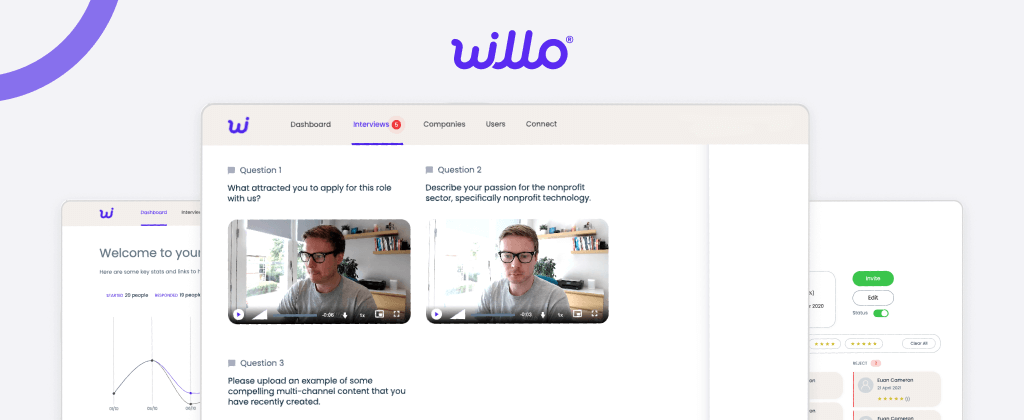
Willo focuses on delivering a simple, flexible, and globally accessible video interviewing experience. Designed with user convenience at its core, the platform’s browser-based interface enables candidates to record video responses directly through a link. This makes it especially effective for international hiring, where speed, accessibility, and simplicity are priorities.
Key Features
- Unlimited Interviews: Willo’s plans include unlimited candidate interviews and responses, removing the restrictions that often come with user count-based or volume-based pricing. This can be convenient for businesses that handle fluctuating or seasonal hiring cycles.
- No Login Required: Candidates can access interviews via a secure link, record their responses, and submit them, all without creating an account on Willo. This eliminates technical friction and unnecessary sign-ups.
- Custom Branding & Question Sets: Willo allows employers to personalize the interview experience by adding a company logo, intro videos, and question sets tailored to roles and skills.
- Global Accessibility: The platform can be adjusted for cross-time-zone hiring and claims reliable performance on any device or connection.
Pros
- Willo’s browser-based setup keeps adoption simple, letting recruiters launch one-way interviews without installations.
- Its transparent, budget-friendly pricing makes it a solid option for startups and small teams.
- A mobile-friendly, low-latency interface gives candidates easy access from any device with minimal technical friction.
Cons
- Willo only offers one-way interviews, which limits flexibility for teams that need both live and asynchronous formats in one platform.
- The platform lacks advanced AI scoring or automated analysis, so evaluations rely more on manual review.
- Its lightweight feature set makes it less suited for enterprises that need end-to-end workflow automation.
4. Spark Hire
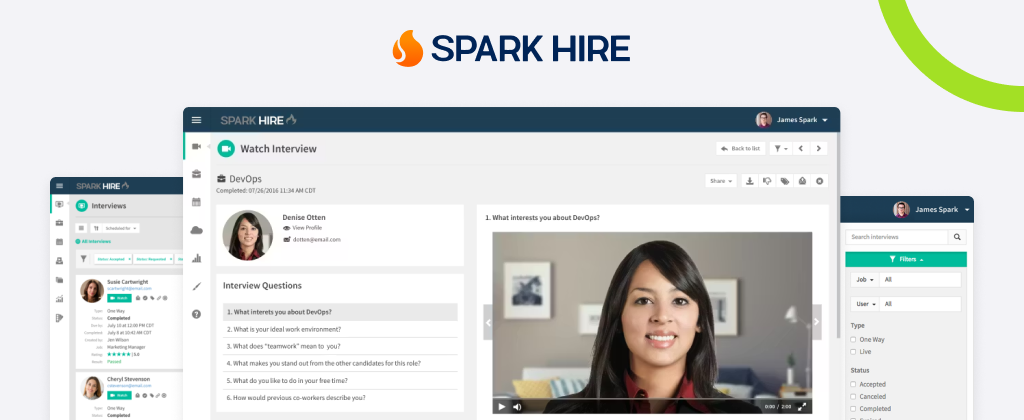
Spark Hire is known for its ease of use and reliability, making it a good-to-have solution for small and mid-sized businesses. The platform offers both asynchronous and live video interview options, empowering hiring teams to evaluate candidates efficiently without requiring heavy technical expertise.
Key Features
- One-Way & Live Interviews: Spark Hire allows recruiters to conduct both asynchronous and live interviews within the same interface. Teams can pre-define questions for candidates to answer on their own time, or host virtual sessions when direct interaction is preferred.
- Candidate Playback & Sharing: Recruiters can replay candidate responses, share recordings with teammates. This collaborative review process ensures that all stakeholders are on the same page. Its centralized dashboard allows multiple recruiters or managers to review, rate, and comment on candidate responses. This makes evaluation transparent and reduces bias by incorporating multiple perspectives into the decision-making process.
- Branded Interview Experience: The platform offers basic branding tools, allowing organizations to add company logos and personalized introduction messages. These small touches create a more professional and consistent candidate experience.
- ATS Integrations: Spark Hire integrates with popular applicant tracking systems like BambooHR, JazzHR, and Lever. These integrations help streamline candidate management, keeping all interview data organized within existing recruiting workflows.
Pros
- Spark Hire requires minimal setup, letting teams start recording questions and collecting responses quickly.
- Its affordable, transparent pricing makes it a strong fit for startups and mid-sized companies.
- The simple, responsive interface supports an easy candidate experience across devices.
Cons
- The platform lacks advanced AI insights and analytics features, so teams may rely more on manual evaluation.
- It’s not well-suited for large enterprises with complex compliance or integration needs.
- Customization options are limited, which can be restrictive for organizations seeking deeper branding and automation controls.
5. MyInterview
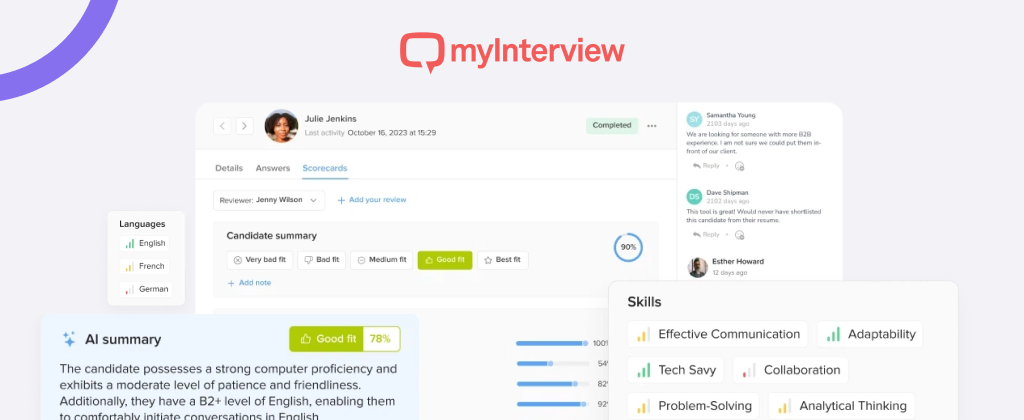
myInterview is a video interviewing platform that blends one-way video responses with personality and culture-fit analysis. It enables recruiters to move beyond resumes and assess who the candidate is and what skills they bring to the role. It is built for organizations that emphasize candidate experience, soft skills, and cultural alignment, while still offering scalable screening for higher-volume hiring.
Key Features
- AI-Powered Personality Insights: Through its AI engine, myInterview analyzes candidate responses to assess the candidate’s personality based on the five personality traits model (Openness to Experience, Conscientiousness, Extraversion, Agreeableness, and Emotional Stability).
- Custom Branding: The platform supports white-labeling so the interview landing pages, emails, and response pages portray the organization’s branding, logo, and colors.
- Question Libraries & Templates: It offers ready-to-use question banks for multiple job roles. Users can also save these job templates to reuse for roles with similar requirements, speeding up setup.
- ATS & Workflow Integrations: myInterview supports integrating platforms through Zapier to enable embedding video screening into existing workflows.
Pros
- It highlights culture fit and soft skills, helping teams identify candidates whose personalities and communication styles align with the organization.
- The interface is sign-up-free, intuitive, and mobile-friendly, making recording responses easy for candidates.
- Platform setup requires minimal technical support, making it ideal for small teams or startups. The dashboard takes a day or two to get used to.
- MyInterview offers a free trial and flexible pricing tiers to make it accessible for budget-conscious organizations.
Cons
- It lacks enterprise-level features such as advanced workflows, global compliance, and deeper analytics.
- Fewer publicly documented security certifications may be a concern for regulated industries.
- The platform offers only surface-level insights and basic personality profiling, making analytics less comprehensive than competitors like Jobma.
- The platform focuses mostly on candidate video screening and does not support other formats like live interviews or autonomous assessments.
6. Hirevire
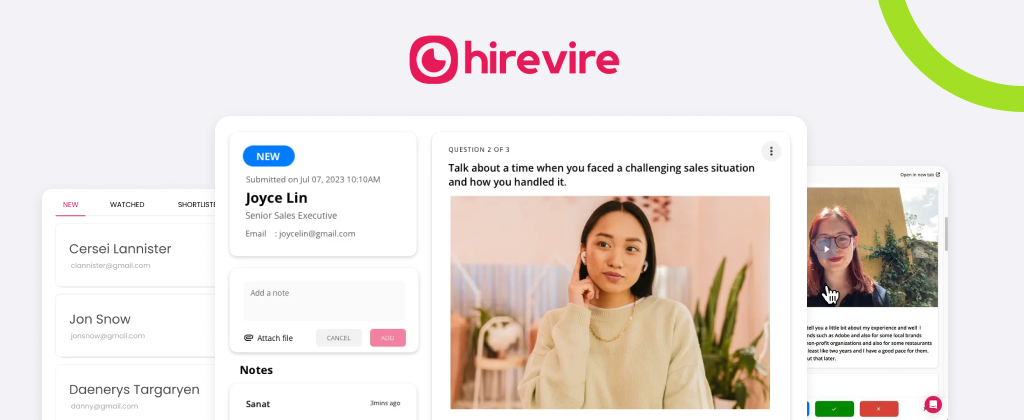
Hirevire is an accessible asynchronous interview tool that enables recruiters to collect responses via video, audio, or text. It’s specifically designed for startups and small teams needing a simple, no-frills platform for screening.
Key Features
- Versatile Response Formats: Hirevire allows candidates to submit answers in video, audio, or text form, giving recruiters flexibility to assess applicants based on their preferred communication style and technical accessibility.
- Effortless Question Builder: The platform includes an intuitive question builder that lets recruiters design interview sets, add instructions, and send invitations within a few steps.
- Shareable Candidate Links: Recruiters can generate secure, shareable interview links and send them via email, simplifying the candidate experience.
- File Upload Support: Candidates can attach additional documents, such as resumes, work samples, or certifications, directly with their responses, giving recruiters a more complete view of each applicant.
Pros
- The simple, user-friendly interface requires little setup or training, making it ideal for small teams.
- It supports video, audio, and text responses, allowing recruiters to create dynamic interviews.
- Free trials and affordable plans make it an entry-level option for startups and small businesses.
- A quick, login-free recording flow offers a convenient candidate experience across devices.
Cons
- Scheduling tools are basic and lack automated invites, reminders, and advanced coordination features.
- Native integrations are limited, with most connections relying on Zapier or webhooks instead of deep ATS integrations.
- As a newer platform, it has less market maturity and a smaller enterprise customer base than established competitors like Jobma.
7. PMaps
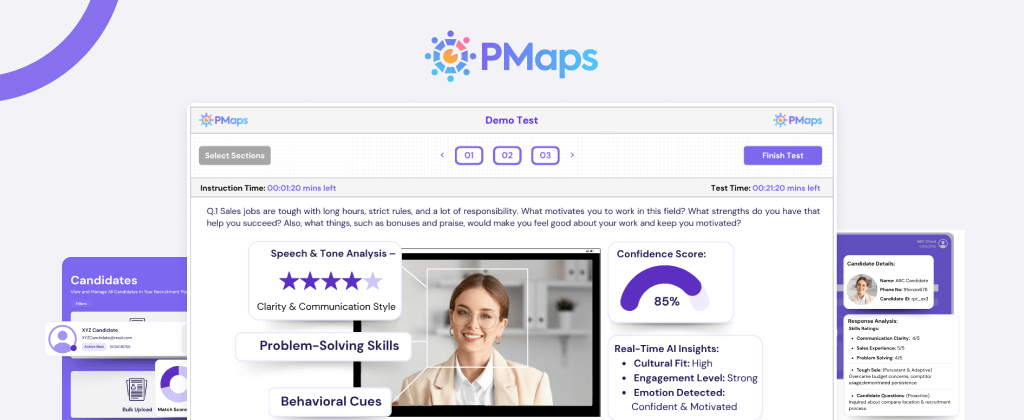
PMaps is a talent assessment platform and video interviewing platform that combines video interviews, AI voice agents, and psychometric assessments in a single workflow. It’s used by teams in BFSI, BPO, GCCs, retail, and other service-led industries that need to screen high volumes of applicants without losing depth or fairness in evaluation.
Unlike tools that focus only on one-way video, PMaps brings together structured video interviews, voice-based conversations, and validated assessments to help recruiters see how candidates think, speak, and behave in real-world scenarios. The result is a more complete view of role fit, culture fit, and long-term potential.
Key Features
- Multi-Format AI Interviews: PMaps supports one-way video interviews, AI-led video interviews, and AI voice calls in one interface. Recruiters can mix and match formats based on the role – for example, voice interviews for call center roles and video interviews for sales or customer-facing profiles.
- Built-In Psychometrics & Skills Tests: The platform includes cognitive ability tests, personality assessments, language and communication tests, and role-specific skill evaluations. Interview performance and test results are combined into one scorecard, making it easier to compare candidates objectively.
- Unified Talent Intelligence Dashboard: Recruiters get a centralized dashboard with candidate scores, red/green flags, and side-by-side comparisons. Filters by location, role, batch, or hiring campaign make it simple to identify top performers and spot patterns across hiring cycles.
- Structured Scorecards & Benchmarks: PMaps uses standardized scorecards, rating scales, and benchmarks tailored to each role. This helps interviewers and hiring managers evaluate candidates consistently across branches, shifts, and hiring teams.
- Candidate-Friendly Experience: The platform is designed for mobile-first usage with simple links, reminders, and clear instructions. Candidates can complete assessments and interviews at their convenience, without complicated logins, making it suitable for large, diverse applicant pools.
- Branding & Custom Workflows: Employers can customize branding, intro videos, question sets, and messaging, and configure different flows for different roles or business units (for example, separate blue-collar, sales, and customer support journeys).
Pros
- Combines video interviews, voice-based screening, and psychometric assessments in one system, reducing the need for multiple tools.
- Strong fit for volume-heavy, customer-facing roles in industries like BFSI, BPO, and retail where communication, stability, and behavior matter as much as experience.
- Structured scorecards, benchmarks, and dashboards help reduce subjectivity and make hiring decisions more data-driven.
- Customizable branding, messaging, and question libraries help reinforce the employer brand and create a consistent candidate experience.
- Flexible plans with a 7-day free trial make it accessible for growing teams that want to experiment before committing.
- Pre-built workflows and templates for common roles help teams go live quickly without lengthy implementations.
Cons
- PMaps may have lower brand recognition globally compared to long-established video interviewing giants, so some teams may need more internal buy-in or demos.
- Advanced customization (for example, deeply tailored analytics or highly specific role frameworks) may require support from the PMaps team rather than being fully self-serve.
- For organizations that only want a very lightweight, one-way video tool with no assessments attached, PMaps’ broader feature set may feel more than they strictly need.
Our Recommendation
Video interview platforms offer speed, fairness, and flexibility, empowering recruiters to make informed hiring decisions.
While each platform brings unique strengths, Jobma stands out for its AI-driven video interviewing, talent intelligence, and compliance-first infrastructure. Its extensive accessibility and analytics features make it the most balanced and future-ready solution for global businesses.




